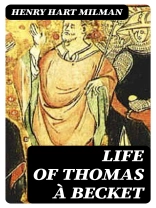In ‘Life of Thomas à Becket, ‘ Henry Hart Milman delivers a compelling narrative that explores the complex interplay between religion, politics, and personal conviction in medieval England. Milman’s rigorous historical analysis is complemented by a lyrical prose style that evokes the emotional gravity of Becket’s life and martyrdom. The book meticulously charts Becket’s rise from a position of royal favor to his ultimate conflict with King Henry II, illustrating how these events reflect broader themes of authority, integrity, and the struggle for spiritual autonomy against the backdrop of the growing tension between church and state during the 12th century. Milman, a distinguished historian and theologian, draws on his deep understanding of ecclesiastical history and his own experiences in the realms of church and state to illuminate Becket’s remarkable journey. His scholarly background, combined with a passionate commitment to uncovering the truth, informs Milman’s interpretation of Becket not merely as a historical figure but as a symbol of moral fortitude in the face of overwhelming odds. This book is a must-read for anyone interested in the rich tapestry of medieval history, religious conflict, or the enduring struggle for personal integrity. Milman’s nuanced portrayal of Thomas à Becket invites readers to reflect on the implications of his life and legacy, making it an essential addition to both academic and personal libraries.
Об авторе
Henry Hart Milman (1791–1868) was a renowned English historian, poet, and ecclesiastic. Born in London, Milman was educated at Eton and Brasenose College, Oxford, where he demonstrated a prowess in poetry and drama that presaged his literary contributions (Chisholm, 1911). As a clergyman ordained in the Church of England, Milman served as Dean of St Paul’s Cathedral, balancing his ecclesiastical duties with his scholarly pursuits. His literary style artfully wove narrative and analysis, often focusing on religious and historical subjects. Milman’s profound work ‘Life of Thomas à Becket’ delineates the dramatic and tumultuous life of the Archbishop of Canterbury, a seminal figure in the conflict between church and state during the 12th century. It exemplifies his penchant for meticulous research coupled with compelling storytelling, shedding light on the religious, political, and social nuances of medieval England. Beyond hagiography, Milman’s writings on historical figures are known for their critical engagement with the sources and their contribution to the broader historiographical discourse of his time. His works resonate with scholarly fidelity and literary finesse, reflecting the depth and breadth of his expertise as a historian, a theologian, and an artist of the written word (Milman, 1860).












